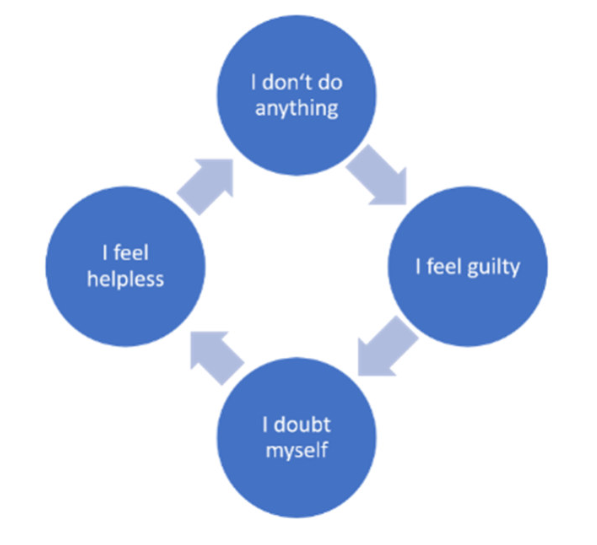The word “Procrastination” comes from the Latin word procrastinatus. The prefix pro means “forward” and crastinatus stands for “tomorrow”. Today, when we talk about procrastination, we refer to a situation where we find it difficult to persuade ourselves to do the things we should do or would like to do. Instead, we perform useless activities and feel guilty about it afterwards. Procrastination can be a major stumbling-block for NEETs hindering them showing up for trainings, starting to apply for a job or getting important paperwork done.
Young people are facing a world where the number of decision-makings per day is staggering. They have the freedom to make their own choices and are socialized to worship self-optimization, efficacy and outstanding careers. Yet, they often struggle to prioritize tasks at hand, understand their own values and pursue their very own definition of happiness. But what to do with the greatest intentions if one is already tripping on the first steps? Writing a CV, looking for potential employers or drafting a business plan can turn into an insuperable obstacle when procrastination kicks in – and to make it even worse: After having spent the entire afternoon watching entertaining YouTube or TikTok videos rather than preparing for a job interview makes us feel utterly guilty. It seems that everybody else is organized and mastering the virtue of industriousness. The natural human reaction is to start doubting oneself. Especially younger people or people who have already experienced major setbacks in their lives will mistake procrastination for a weakness in character. Welcome to the vicious circle of procrastination:

The first step out of procrastination is the simple realization: It is normal. Every human being is a procrastinator. Some people are more organized, disciplined or intrinsically motivated but everybody is procrastinating to some extent. The important things is to be aware of it and to start realizing where procrastination actually causes harm. Therefore, tools such as vision boards can be helpful to understand a person’s true north and possible directions and priorities of the short and long-term goals. Vision boards are a powerful tool, especially for NEETs. Firstly, they can become creative and write, paint, glue and scribble their values, interests, goals and visions on a white piece of paper. They decide on how to present it and are not limited to font sizes or line distance. There is no right and wrong and no pressure to “fail”. Creativity unleashes potential and deep personal longings. Secondly, vision boards are useful for people who struggle to bring their emotions or wishes into writing. Instead, they can use pictures, colours and signs to express themselves. That’s a lot of fun and devoid of norms and rules.
Once the vision board is finished, it is much easier for the NEET to write down sources of motivation and inspiration in a labour market context. NEETs, who face difficult labour market situations, can use this space to come up with creative solutions. An open discourse with coaches and other participants brings in other points of views and ideas. The NEETs can work on ideas and plans of labour market scenarios and jobs that truly inspire them and match with their personal values and notions (such as working hours, distance, sectors of interest, expertise). At this point, coaches can support the NEETs to formulate specific goals. Depending on the NEET’s initial situation the goals can be smaller or bigger (e.g. make a list of ten employers in the region that work in a specific sector; make professional pictures for the CV, learn a new skill). The main idea of the vision board is to find intrinsic motivation. When people see the purpose in their actions, when they actually want to perform these actions, the intrinsic motivation arises. Working more towards inner motivation and satisfaction helps to overcome procrastination and start to become active, not because of the final goal but because of the purpose/journey.
Another powerful tool to step out of procrastination is to cultivate certain forms of daily routines. There are many different ways to work efficiently and numerous articles and books that claim to know the perfect way to “avoid procrastination”. The truth is, there is no perfect tool for everyone. Everybody has particular strengths and weaknesses and what works best for one person could be a total disaster for another. Some people use To-Do lists to stay focused. It is useful to order the To-Dos according to priority to make sure that important tasks are finished on time. To-Do lists can be combined with the Time Blocking Method. This means to plan our days ahead and to dedicate specific hours to accomplish certain tasks. Especially for NEETs it can be helpful to dedicate time to both proactive and reactive blocks. In the proactive time slot, they can work on cover letters, call potential employees or learn a new skill. In the reactive block, they do something that fills them with joy, e.g. playing and instrument or a computer game, meeting a friend etc.
Some coaches use brainstorming sessions where NEETs can present their favourite tool to avoid procrastination. Participants that are more reluctant to change will feel a certain peer pressure and may start to work on their own procrastination, too. Others may get inspired to try something new and it is empowering for participants to present their own experiences in front of the group.
Procrastination is not a flaw but a part of being human. It might be impossible to overcome procrastination completely, but there are some simple steps to be more aware of it and to start fighting it. Coaches can help NEETs to work on their personal strategy and implement certain tools and strategies into their daily routine:
- Realization: When does procrastination cause harm?
- Vision board: What cultivates inner motivation, what are true interests?
- Daily routine: Which tools work for me to be more concentrated? Which tools help me to finish important tasks?
- Remember: Procrastination is a part of being human. Everyone is a procrastinator and it is not a weakness in character.


